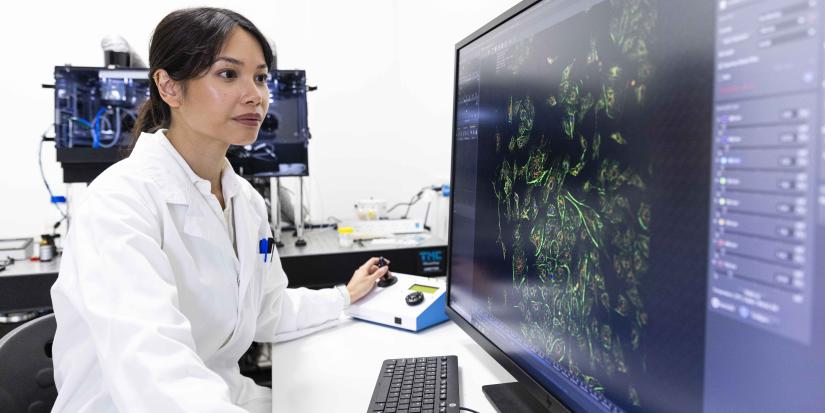Alison's placement with specialist molecular diagnostics company Genetic Signatures focused on enhancing the capacity of the company’s own brand PCR tests. The tests detect a wide range of illnesses, including COVID-19.
“My project dealt with their sample processing kit, which is a universal kit that deals with all different types of human samples,” she says.
“There was a very specific component in it that was showing unstable traits when it came to packaging and manufacturing, so my project was about looking at different chemical alternatives.”
For Alison, the experience provided a unique opportunity to contribute to the global pandemic response.
It was also an undeniable demonstration of the importance of research in confronting urgent, emerging challenges — while working towards a publication, she was helping to deliver real-world diagnostic tools that could make a measurable difference to countless lives.
“Because of the sudden increase in demand for PCR tests for COVID, there was a very big push from Genetic Signatures to make sure the products they were sending out were going to be as reliable as possible and as stable as possible,” she says.
Building more than just technical skills
The internship came about through a partnership between UTS and APR.Intern, a national PhD internship provider.
Research internships are one way UTS ensures that students are supported to create and share knowledge that benefits our economy, environment and society.
All UTS research students have the option to undertake a professional placement with host organisations including public and private sector companies, start-ups, NGOs and other creative and community partners.
For Alison, who had always been curious about exploring different career paths, the internship experience was a unique opportunity to apply her skills in a real-world setting.
This internship was a really good way to exercise all the different things I’ve learnt in the lab, but in a professional environment.
- Dr Alison Ricafrente
It helped that the technical aspects of the internship were closely aligned with Alison’s PhD research, in which she was exploring how pathogens use their own RNA to infect mammalian hosts and regulate the host’s immune response.
But it also helped her to develop – and practice – a different type of professional and interpersonal skills than those she deployed at university
“It was definitely a different way of communication and handling relationships that you don’t really get in the academic space,” Alison says.
“I felt like I was broadening my perspective on not only the science behind my project but the industry links to it as well.”
Getting ahead of the recruitment curve
The benefits from collaboration between research students and external organisations go both ways.
Research shows that skills shortages and access to talent are key barriers to innovation for Australian companies. Research internships connect organisations to talented researchers who can drive focused solutions in a short timeframe.
Establishing those relationships early on can help organisations address internal talent gaps with specialist expertise or cultivate next-generation leaders who can grow with the company.
“For Genetic Signatures, the internship program through APR.Intern has been really successful,” says Dr Sacha Mytton, Principal Scientist, Product Translation and Alison’s internship supervisor at Genetic Signatures.
“Alison was our third Intern through [this program]; we’ve had seven in total and employed six, so it has been a fantastic way for us to gain talent.
“She did an excellent job on her project and the outcome resulted in a significant change to our sample processing kit. It was an easy decision to offer her a full-time position in our R&D team.”
Such career opportunities are often top of mind for research students, too — particularly those who don’t see themselves pursuing a traditional academic career.
For Alison, the internship offered substantial reassurance that a PhD is a solid pathway to a vibrant career outside of academia. Today, she’s a full-time product development scientist in the company’s R&D team.
“It’s everything I’d hoped for in terms of a research industry role,” she says.
“Companies like Genetic Signatures put a lot of money into their R&D. When it comes to exploring ideas and designing experiments, it feels limitless.”
⇢ Interested in combining a research degree with industry placement? Find out more about our degrees

